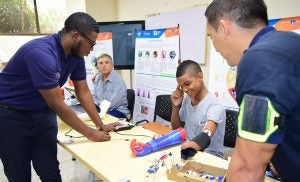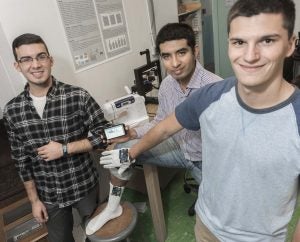Human Subjects Protections:
Guidance for Conducting Research in Schools
and Use of Education Records
If you plan to do research that will involve collecting data in schools and/or accessing information from education records, you should be aware of laws that can impact your data access and collection procedures and that can limit the IRB’s ability to waive consent.
you should be aware of laws that can impact your data access and collection procedures and that can limit the IRB’s ability to waive consent.
FERPA: If you plan to obtain information from student education records as part of your research, be aware that the Federal Education Rights and Privacy Act (FERPA) sets forth consent requirements (and exceptions) for accessing information in student education records.
FERPA is a Federal law that regulates the disclosure of personally identifiable information from student education records. The law applies to all schools that receive funds under an applicable program of the U.S. Department of Education. FERPA stipulates that an educational institution has the authority to determine what information may be accessed from an Education Record. If an institution denies an investigator access to information in an Education Record, the IRB cannot overrule the decision.
FERPA gives parents certain rights with respect to their children’s education records. These rights transfer to the student when the student reaches the age of 18 or attends a school beyond the high school level (referred to as “eligible students”). As a general rule, schools must have written permission from the parent or eligible student to release information from a student’s education record. Unless research that falls within FERPA qualifies for an exception under FERPA to the general rule of parental/eligible student consent, the IRB cannot waive consent.
The FERPA regulations specify that a parent or eligible student must provide a signed and dated written consent for disclosure of personally identifiable information from education records, unless the disclosure falls within one of the exceptions discussed below. FERPA’s consent provisions require that the consent information be specific about the records that may be disclosed, the purpose of the disclosure, and the identify of the individual or group to which the records will be disclosed.
 Student records can be disclosed to school officials who have a legitimate educational interest without consent from the parent/eligible student under FERPA. Many educators who are also researchers are surprised to find that the student records they personally hold (e.g., tests, journals, written assignments, etc.) are considered part of the official educational records of a student. In addition, when conducting research, an educator may not be considered to have a legitimate educational interest in the records they otherwise handle on a regular basis.
Student records can be disclosed to school officials who have a legitimate educational interest without consent from the parent/eligible student under FERPA. Many educators who are also researchers are surprised to find that the student records they personally hold (e.g., tests, journals, written assignments, etc.) are considered part of the official educational records of a student. In addition, when conducting research, an educator may not be considered to have a legitimate educational interest in the records they otherwise handle on a regular basis.
Exceptions to the general rule of parental/student consent under FERPA
FERPA sets out various exceptions to the general rule that consent must be obtained for release of personally identifiable information from student education records. The exceptions most likely to be relevant for University researchers are described below:
Directory information: FERPA allows schools to designate and disclose, without consent, certain items of information as “directory information”, such as a student’s name, address, telephone number, date and place of birth, honors and awards, and dates of attendance.
Each educational institution designates what information is considered directory information. FERPA requires that students be given the opportunity to file a request to prevent disclosure of directory information, commonly known as “opting out”. An institution will not release any information on a student, even directory information, if a student has “opted out”. The Investigator should contact each institution from which he/she proposes to access student records and follow that institution’s FERPA policy and procedures when accessing directory information.
De-identified information: An educational institution may release information from student education records without the consent required under FERPA after all personally identifiable information has been removed from the records, provided that the educational institution has made a reasonable determination that a student’s identity would not be personally identifiable. Thus, a school official with legitimate access (other than the researcher) may strip the records of any identifying information and provide the data to the researcher.
Use of coded data: An educational institution can release de-identified student level data from education records for the purpose of education research by attaching a code to each record that may allow the recipient to match information, provided that the educational institution does not disclose any information about how it generated and assigned the code, or that would allow the recipient to identify a student based on a code; the code is not used for any purpose other than identifying a de-identified record for purposes of education research; and the code is not based on a student’s social security number or other personal information.
Research conducted for or on behalf of educational institutions: Personally identifiable information from student education records may be disclosed by an educational institution/agency to researchers when the disclosure is to organizations conducting studies for, or on behalf of, educational agencies or institutions to: 1) develop, validate, or administer predictive tests; 2) administer student aid programs; or 3) improve instruction. If PII from student education records will be disclosed to a researcher under this exception, the researcher must enter into a written agreement with the educational institution that contains specific assurances on data confidentiality. See 34 CFR Section 99.31(a)(6).
Please click for information of how FERPA applies to faculty.
For information about how FERPA applies to students at another institution where the research will be conducted, please contact that institution.
Please review the U.S. Department of Education website for further information on FERPA, including webinars.
 PPRA: The Protection of Pupil Rights Amendment (PPRA) (20 U.S.C. § 1232h; 34 CFR Part 98), also known as “Student Rights in Research, Experimental Programs, and Testing,” is a federal law that affords certain rights to parents of minor students with regard to surveys that ask questions of a personal nature. The No Child Left Behind Act of 2001 contains a major amendment to PPRA that gives parents more rights with regard to the surveying of minor students, the collection of information from students for marketing purposes, and certain non-emergency medical examinations.
PPRA: The Protection of Pupil Rights Amendment (PPRA) (20 U.S.C. § 1232h; 34 CFR Part 98), also known as “Student Rights in Research, Experimental Programs, and Testing,” is a federal law that affords certain rights to parents of minor students with regard to surveys that ask questions of a personal nature. The No Child Left Behind Act of 2001 contains a major amendment to PPRA that gives parents more rights with regard to the surveying of minor students, the collection of information from students for marketing purposes, and certain non-emergency medical examinations.
The PPRA applies to any “local educational agency” that receives funding from the U.S. Department of Education. A “local educational agency” means an elementary school, secondary school, school district, or local board of education that is the recipient of funds from the U.S. Department of Education. PPRA also applies to research funded by the U.S. Department of Education.
PPRA has two sets of requirements for surveys:
- Requirements that apply to “protected information” surveys that are funded in whole or in part by the U.S. Department of Education.
- Requirements that apply to “protected information” surveys that are funded by sources other than the U.S. Department of Education and that are administered or distributed by education institutions that receive funds from the U.S. Department of Education (i.e. public elementary and secondary schools and some private schools).
PPRA lists eight categories of protected information for survey responses:
- political affiliations of student or student’s parent;
- mental or psychological problems of student or student’s family;
- sex behavior or attitudes;
- illegal, anti-social, self-incriminating or demeaning behavior;
- critical appraisals of others with whom students have close family relationships;
- legally recognized privileged or analogous relationships;
- religious practices, affiliations or beliefs of student or student’s parent;
- income, other than as required by law to determine eligibility for participation in a program or for receiving financial assistance under such program.
Practical Implications of PPRA for Parental Consent:
Requirements for Protected Information Surveys funded by the U.S. Department of Education
- Does the research involve “protected information” surveys?
- Are the surveys U.S. Department of Education-funded in whole or part?
- Are the surveys “required”?
If the answer is yes to the three questions, PPRA affords parents the right to provide active consent. Thus, even when the criteria for a waiver of parental permission at 45 CFR 46.116 or 45 CFR 46.408(c) are met, the IRB cannot approve waivers of parental permission for surveys, analyses, or evaluations where the primary purpose is to reveal information concerning one or more of the eight protected areas specified in PPRA.
Prior written parental consent would be required, even if the IRB determined that some of the basic elements of informed consent specified in section 45 CFR 46.116(a) could be waived as inappropriate to the activity.
Requirements for Protected Information Surveys, Funded by Sources other than the U.S. Department of Education and administered or distributed by education institutions that receive funds from the U.S. Department of Education (i.e., public schools and some private schools)
- Do the surveys include protected information?
- Are the surveys being administered or distributed by schools that receive any U.S. Department of Education funds?
If the answer is yes to both questions, PPRA affords parents the right to inspect the surveys before they are administered or distributed and to opt the student out of the surveys.
Researchers whose research is subject to the PPRA should review the policies of the local educational agency early in the study design process.
